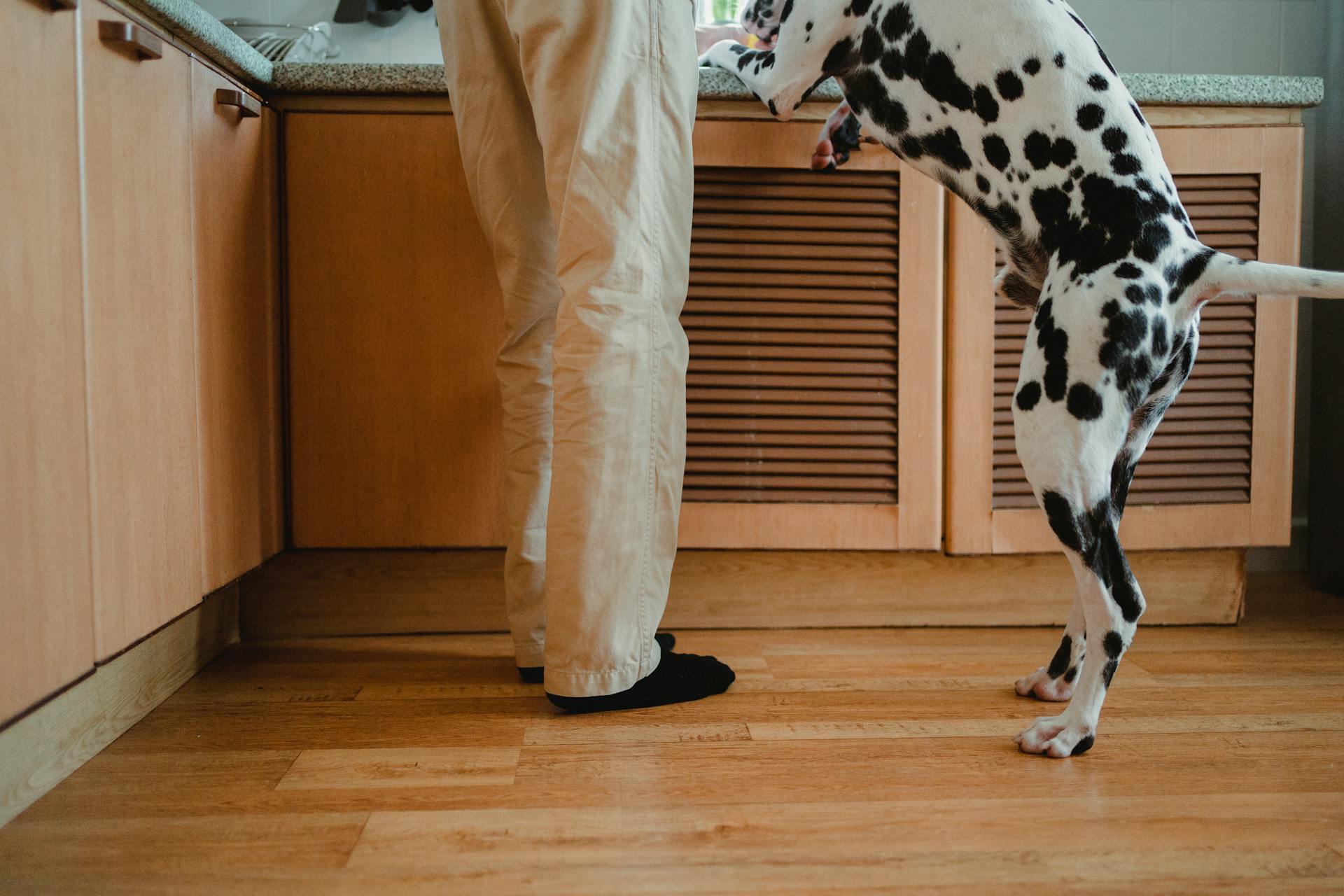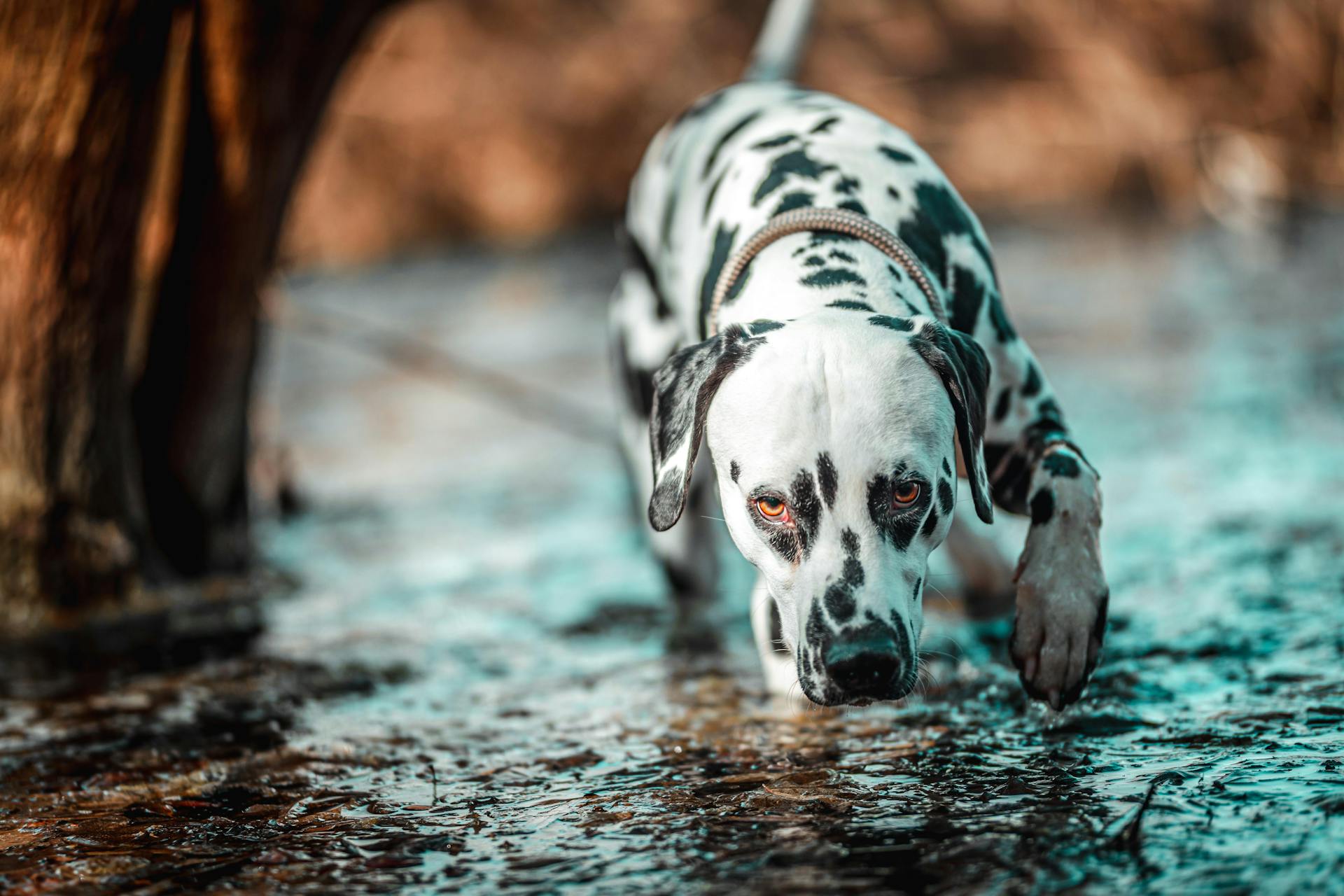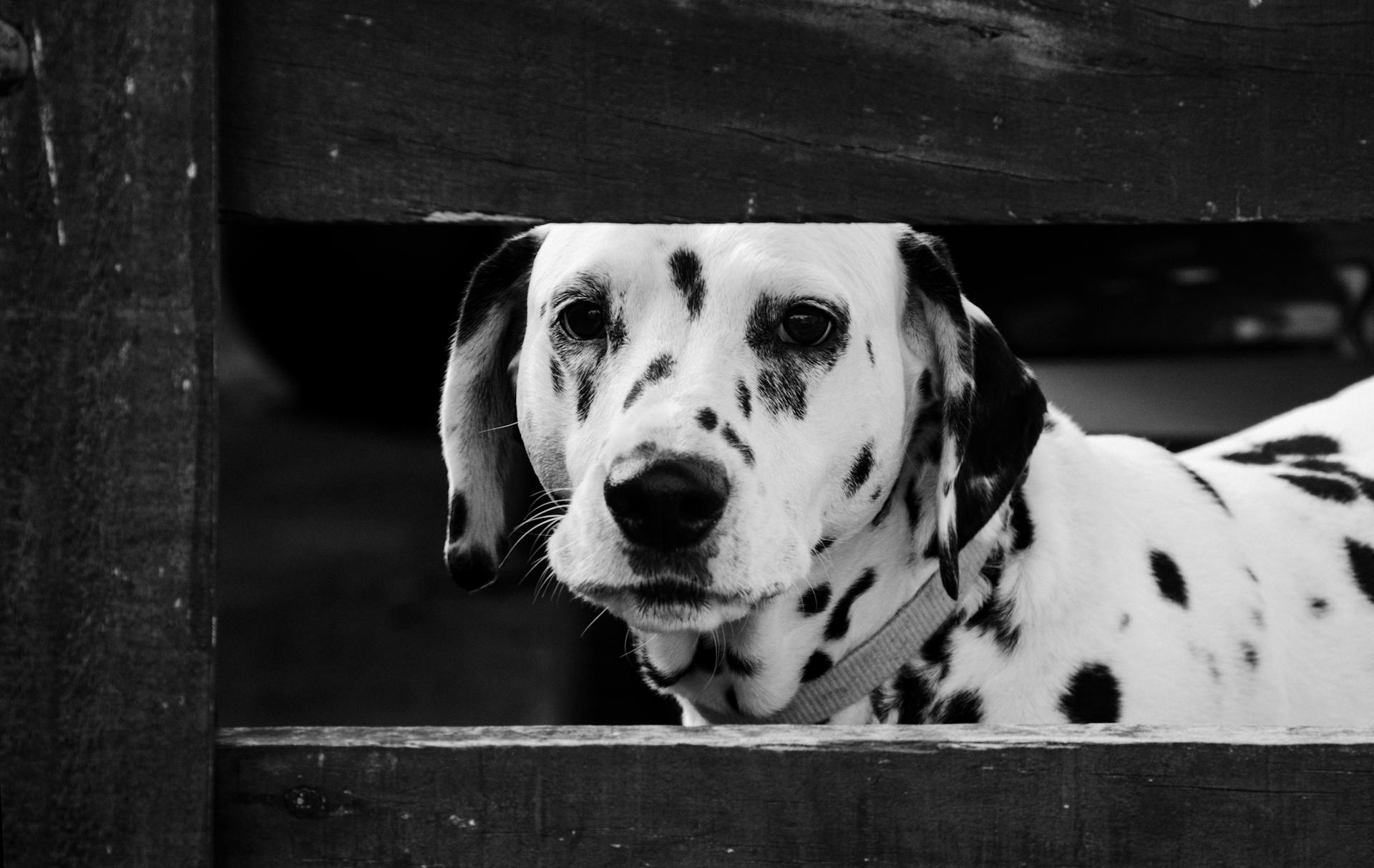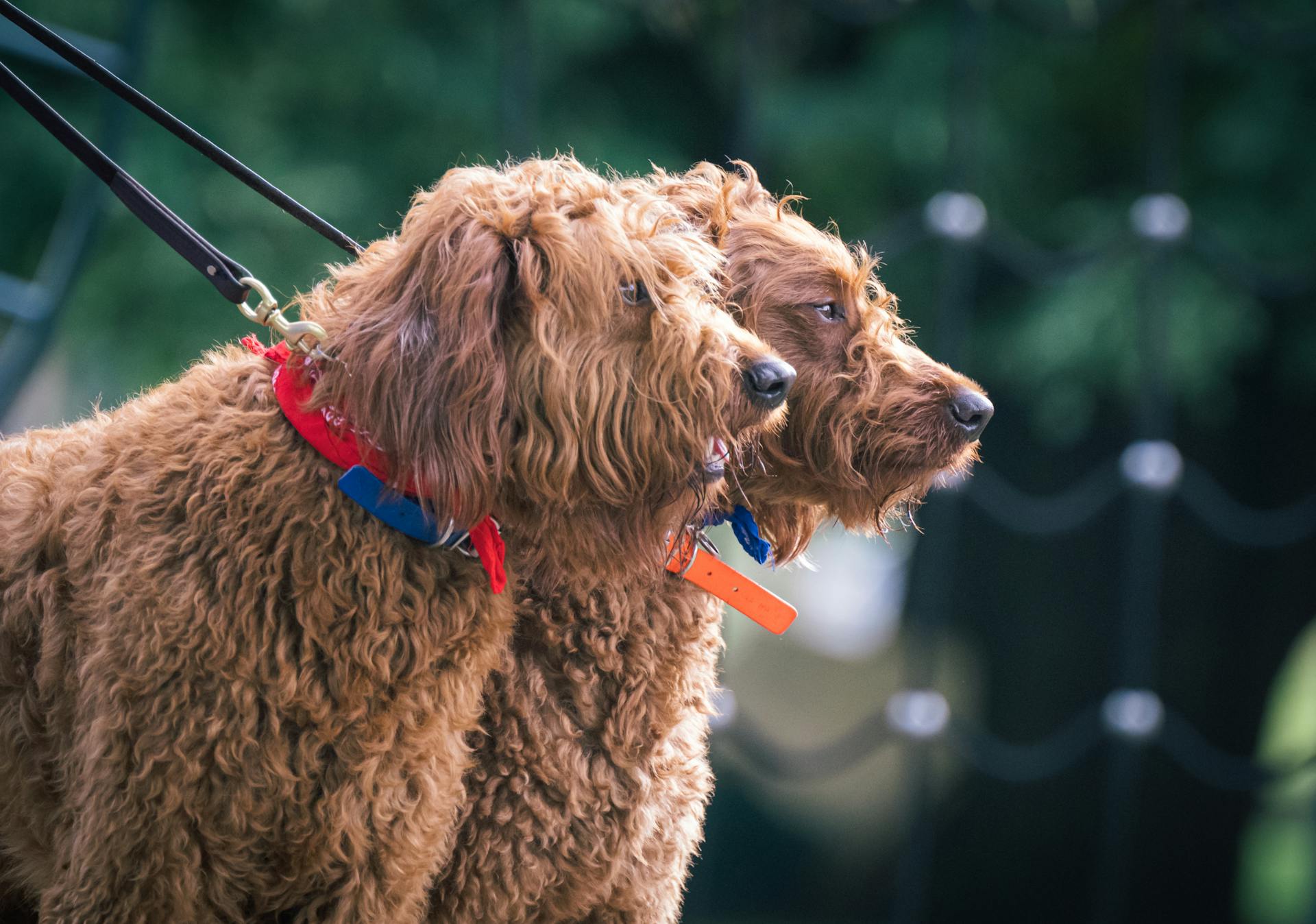
The Dalmatian Lab Mix is a unique and lovable breed that's perfect for active families. They are a cross between a Dalmatian and a Labrador Retriever, resulting in a dog that's both energetic and affectionate.
Dalmatian Lab Mixes are generally medium to large in size, with males weighing between 55-80 pounds and standing 22-24 inches tall. Females typically weigh between 45-70 pounds and stand 21-23 inches tall.
Their short coats are easy to maintain, requiring only occasional brushing and bathing. They are also relatively low-maintenance when it comes to grooming, making them a great choice for busy families.
Despite their energetic nature, Dalmatian Lab Mixes are known to be gentle and patient with children, making them an excellent choice for families with kids.
Understanding the Breed
The Dalmatian Lab mix is an energetic breed that requires regular exercise to stay happy and healthy. They inherit athletic and agile qualities from their Dalmatian and Labrador Retriever parents.
You can expect your Dalmatian Lab mix to love playing fetch or going for a jog. They're well-suited for agility training, which can be a fun way to challenge them physically and mentally.
Their high energy levels mean they need plenty of physical and mental stimulation to prevent boredom and destructive behavior. They're not suited for a sedentary lifestyle, so be prepared to get active with your Dalmatian Lab mix.
Care and Needs
To ensure your Dalmatian Lab Mix grows into a happy and well-adjusted adult, proper training is essential. Training should be a regular part of your daily routine, especially in the early stages of your puppy's life.
Start with basic commands like sit, stay, lay down, and come, and gradually move on to more complex ones. Remember to review old commands frequently to prevent your Dalmador from becoming rusty.
Socialization is also crucial, allowing your puppy to experience new sights, smells, people, and animals. This will help them become more comfortable in unfamiliar environments and reduce the likelihood of aggression or territorial behavior.
The Dalmatian Lab Mix requires a significant amount of exercise to stay happy and healthy. Aim for at least 30–60 minutes of daily activity, which can include brisk walks, jogging, running, playing fetch, or interactive play sessions.
A Dalmador's exercise needs vary depending on their age, health, and physical capabilities. Be sure to tailor the intensity and duration of exercise accordingly, and consider enlisting the help of a fenced-in yard or larger surrounding property to accommodate their energy needs.
Here's a rough guide to the daily exercise needs of a Dalmador:
- Puppies: short bursts of energy (15-30 minutes)
- Adults: moderate to high intensity exercise (30-60 minutes)
By providing regular training and exercise, you'll be well on your way to raising a well-adjusted and happy Dalmatian Lab Mix.
Exercise Needs of the Mix
The Dalmatian Labrador Mix needs a lot of exercise to stay happy and healthy. At least 2-3 hours of exercise per day is recommended, which can be broken down into multiple shorter sessions.
This breed loves to run and play, and they need a lot of space to do so. A giant property or lots of trails are ideal for them. If you don't provide them with enough exercise, they can become frustrated and act out in negative ways.
Some common issues that can arise from a lack of exercise in this breed include digging holes, being aggressive or territorial, escaping from the yard, and chasing animals.
Here's a breakdown of the exercise needs of the Dalmatian Labrador Mix:
As a Dalmatian Labrador Mix owner, it's essential to tailor the intensity and duration of exercise to your dog's age, health, and physical capabilities. This will help keep them happy, healthy, and prevent potential health issues.
Training Needs
Training is one of the most essential components of raising your Dalmatian Lab Mix. It should become your new best friend when you're not away at work or hanging out with friends.
Start with the basic commands like sit, stay, lay down, and come as soon as you get home with the new puppy. Go over what you've taught your Dalmador frequently so they don't become rusty with their old commands.
The more you socialize your pup, the better they'll react to strange and uncertain circumstances. This is crucial for a Dalmatian Lab Mix to become a comfortable and upstanding citizen of the dog world.
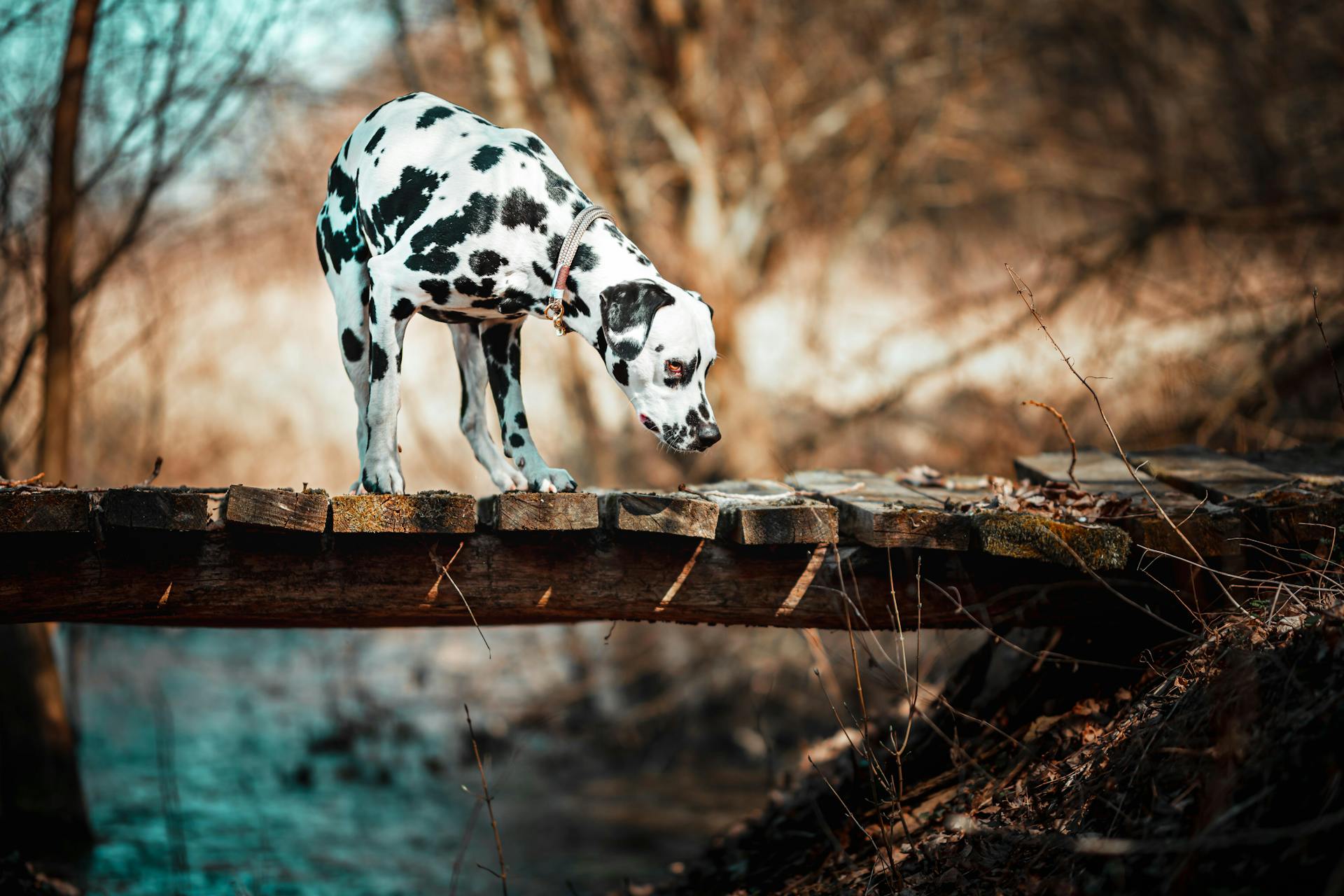
Socialization is an important fundamental step, and the less you do it, the more aggressive or territorial your pup may become. So, take your puppy out wherever you go and allow them to experience new smells, sites, people, and animals.
The one place you should never go with your dog when they're still a puppy is the dog park. It's a recipe for disaster, and they shouldn't socialize with other puppies and dogs before they're vaccinated to avoid disease.
Here are some key characteristics of the Dalmatian Lab Mix's temperament:
- Loving
- Deeply loyal
- Caring
- Watchful over the family and house
- Intelligent
- Patient
- Obedient
Your Dalmador will need at least 30–60 minutes of daily activity to stay happy and healthy. Include brisk walks, jogging, running, playing fetch, or engaging in interactive play sessions to provide mental and physical stimulation.
The Dalmador is a highly intelligent mixed breed that can learn new tricks quickly and is eager to please. However, they may be distractible at times, especially in their youth.
Health and Wellness
The Dalmatian Lab Mix is generally a healthy breed, but like all dogs, they can be prone to certain health issues. Some of the most common health concerns for this breed include hip and elbow dysplasia, which can be caused by overbreeding.
Hip dysplasia is a condition where the hip joint doesn't develop properly, leading to arthritis and difficulty getting up from a resting position. This condition is common in many large breed dogs, including Labradors.
Urinary stones are another potential issue for Dalmatian Lab Mixes. Dalmatians are prone to forming urinary stones, and their offspring may inherit this susceptibility. A balanced diet, plenty of fresh water, and regular veterinary check-ups can help prevent and manage urinary stones.
Some signs of urinary stones include blood in the urine and straining to urinate. Regular eye check-ups are also essential for this breed, as they can be prone to progressive retinal atrophy, a degenerative eye condition that leads to vision loss and sometimes blindness.
Here are some common health issues to be aware of for your Dalmatian Lab Mix:
Lab Health
Labradors are prone to obesity, so it's essential to monitor their food intake and ensure they get enough exercise. A balanced diet and regular veterinary check-ups can help prevent and manage obesity.
Hip and elbow dysplasia are common issues in Labradors, resulting from over-breeding. This can lead to arthritis and difficulty getting up from a resting position.
Urinary stones are another concern in Labradors, particularly if they're prone to eating too much. Signs include blood in the urine and straining to urinate.
Labradors can also be susceptible to allergies, including food and environmental allergies, which can manifest as skin irritations and itching.
Here are some common health issues in Labradors:
- Hip and elbow dysplasia
- Urinary stones
- Allergies
- Obesity
It's worth noting that responsible breeding practices and regular veterinary check-ups can help identify and minimize the risk of these conditions.
Scent-Detection Abilities
Dalmadors can inherit a keen sense of smell from their parent breeds, Dalmatians and Labradors, making them potential candidates for scent-based training.
This sense of smell can be a valuable asset in various activities, such as search-and-rescue work.
Both Dalmatians and Labradors are known for their excellent scent-detection abilities, and it's likely that Dalmadors will excel in these areas as well.
Ownership and Compatibility
Dalmatian lab mixes are generally great with other pets, especially if socialized from an early age. They have a social and friendly nature that makes them good companions for other animals in the household.
Their adaptability and loving nature also make them a great fit for families with children. If you're considering bringing a Dalmatian lab mix into your family, be prepared for a loyal and protective companion.
Here are some key traits to keep in mind when considering the compatibility of a Dalmatian lab mix:
- Loving
- Deeply loyal
- Caring
- Watchful over the family and house
- Intelligent
- Patient
- Obedient
These characteristics will serve you well, but remember that Dalmatian lab mixes need plenty of mental stimulation to prevent boredom and stay happy and healthy.
Pet Compatibility
Dalmadors are generally good with other pets, especially if socialized from an early age. They have a friendly and adaptable nature that can make them great companions for other animals in the household.
If you have young children, it's essential to supervise interactions between them and your Dalmador. These dogs can be energetic and may accidentally knock small kids around.
Dalmadors are intelligent and can learn to get along with other pets, but it's crucial to introduce them slowly and under controlled circumstances. They're also highly energetic, so they'll need plenty of exercise and mental stimulation to prevent boredom.
If you're considering getting a Dalmador, here are some key things to keep in mind:
- They need at least two hours of exercise on a daily basis.
- They can get bored if left alone or cooped up for long periods of time.
- They require plenty of mental stimulation to prevent boredom.
- They're highly energetic and may accidentally knock small kids around.
Overall, with proper socialization and care, Dalmadors can make wonderful companions for families with children and other pets.
Pet Ownership Essentials
Dalmadors are generally social and friendly, making them a great fit for families with other pets. With early socialization as puppies, they can get along well with other animals in the household.
Their adaptable nature is a big plus, allowing them to adjust to new environments and companions. However, it's essential to remember that every dog is unique, and proper socialization is key to ensuring harmonious household dynamics.
To ensure a smooth transition for your Dalmador, it's crucial to consider the commitment involved in adding a canine to your family. This includes providing proper care, attention, and resources for your new furry friend.
Dalmadors are known for their loving and dynamic personalities, but it's essential to be prepared for the responsibilities that come with pet ownership.
Diet and Nutrition
When you're feeding your Dalmatian Lab mix, it's essential to provide high-quality kibble as the main staple of their diet. This will help satisfy their dietary needs and keep them healthy.
Both Dalmatian and Lab parent breeds are prone to obesity, which can lead to joint problems in medium to large dogs like the Dalmatian Lab mix.
To avoid this, check in with your vet about appropriate portion sizes to ensure your dog doesn't gain unnecessary pounds.
Research and Preparation
Researching a Dalmatian Lab mix requires careful consideration and preparation. It's essential to vet where these pups come from and how they were raised, as a responsible breeding program takes time, knowledge, and passion.
A reputable breeder should be willing to have you visit their home or facility before sending money. Don't fall for online scams that bilked prospective pet parents out of nearly $1,000 per transaction in 2021.
You should be able to see the pups in person and ask pointed questions about their lines of dogs. If the breeder is evasive or unwilling to answer, it may be a red flag.
Verify puppy photos on a breeder's website by doing a reverse image search online. Disreputable breeders often use stock dog images to make their dogs appear healthier or more appealing than they are.
A responsible breeder will also ask questions about your lifestyle, interest in this particular crossbreed, and other factors to ensure all pups go to loving homes.
Here are some key questions to ask a breeder:
- Can I visit your home or facility to meet the pups in person?
- Are you willing to answer questions about your breeding lines and the health of the parents' breeds?
- Can I see the puppy's parents and grandparents?
- What is the health guarantee for the puppy, and what medical issues are common in the parent breeds?
It's also essential to research the potential health issues that can affect a Dalmatian Lab mix, such as hearing loss and deafness in Dalmatians. A veterinarian and a breeder can explain crossbreed genetics to determine the likelihood of these occurrences.
Frequently Asked Questions
How big does a Dalmador get?
A Dalmador typically stands between 19-24 inches tall and weighs between 58-80 pounds, with females generally being smaller than males. Their size can vary based on genetic traits, making each individual unique.
What is the temperament of a Dalmatian mix?
Dalmatian mixes are friendly, outgoing, and social dogs that thrive on human interaction. They form strong bonds with their owners, making them great companions
Featured Images: pexels.com
